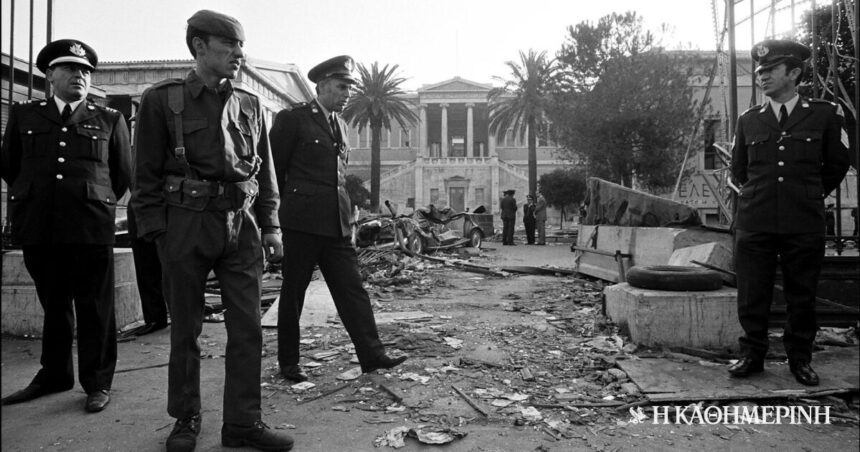1973-2023. Half a century after Polytechnic, the political culture that this pivotal uprising produced remains a matter of intense controversy, both politically and in public discourse and understanding of history. How do we move from myth to political valuation? How can this past become history? And can we separate the generation that lived through the events from the imprint it left in time?
First of all, can we imagine the course of Greece without this critical moment? What would be the course of the country if the Polytechnic had not been established? He would remain Papadopoulos unshakable dictator and would proceed to elections without being overthrown by the hardliners? And what kind of democracy, with what legalization and how many asterisks would it be that would emerge? Everything would have turned out as well as late analysts in relation to the Cyprusthat is, would the latter remain undivided and without the intervention of the Turkish invasion and occupation?
For all the above questions of an anti-historical nature, the answer will never be known. It is good, of course, to take into account the indications that demonstrate that the Polytechnic was not “responsible” for the overthrow of Papadopoulos by Ioannidis, but that it was a decision made that was simply invested with the mantle of urgency due to the facts. His latest move Alexis Papahela “A dark room 1967-1974“makes it clear how extremely dubious it would be to avoid the path to the Cyprus tragedy, as many today claim with too much confidence, without taking into account either the international factor or the explosive situation that prevailed on the Megalonisos, with a civil conflict and an intercommunal conflict in full swing.
It would be interesting, however, to do this exercise from the other side – that is, to realize how problematic the Greek transition to democracy would be without this legitimization from “below” which of course preceded the fall of the junta, but in essence canceled the liberalization experiment. of the dictatorship. The Polytechnic, from this point of view, represents a unique moment of upheaval in the authoritarian South in the 70s, given that neither Frankish Spain nor the Caetano’s Portugal they experienced something similar. This dual nature of the Greek Postcolonialism that makes it so interesting has precisely to do with the fact that beyond the transition from the top, there was this eruption of the grassroots, with the Polytechnic somehow washing away an entire society that to a large extent tolerated her junta. It is no coincidence that the entire post-political treaty was based on the Polytechnic as a national place of memory – with the first national elections taking place on November 17, 1974. So initially the Polytechnic was deified – one only has to look at the documentaries of the time about the first anniversary or the big concerts in the stadiums, to understand the catalytic effect it had on the political culture of the time. The Polytechnic became the “superego” of Postcolonialism, to borrow the tentative term of the historian Antonis Liakos.
Can we imagine the course of Greece without this critical moment? What would be the course of the country if the Polytechnic had not been established?
But how did we get from this apotheosis to the absolute destabilization of the Polytechnic? At first we stumbled upon individual cases of people who took power and the criticism of who they were, their evolution, the fact that they dropped their restraints and put on their ties, and turned out to be politically “few”. But is the Polytechnic the sum of the units and the subsequent success stories that made it up? Such a view removes from the event itself its collective connotation. We also tend to judge based on the few surnames and their subsequent course, without this necessarily giving us interpretative keys to the event itself. As was also seen in recent research in relation to ’68 in France, very few of the students of the time actually had marches that demonstrated the “cashing in” of their activism, which is certainly also true in the case of the Polytechnic.
From there we gradually moved on to a totally unsettling speech about the Polytechnic generation that “destroyed Greece”. The big issue and debate of recent years concerns the so-called culture of violence and lawlessness – a topic that emerged strongly in the public discourse after December 2008 – but also the university asylum and its real or supposed distortions. Here the critiques are now aligned with her own civilization Postcolonial and its famous culture. In short, we went from the halo and idealization of the Polytechnic to its absolute demonization. In this retrospective criticism of the Polytechnic as the catalyst of all subsequent evils, the leveling criticism and retrospective culpability of those who actually resisted partly overcompensates for the absence of mass resistance to the junta. In addition, the struggles over the supposed real “meaning” of the Polytechnic, the instrumentalization of the latter by all sorts of political powers and organizations, the anniversary clashes between police and protesters in a performative type of repetition of the history of each November 17they also put their stone in the discrediting of the event and its importance.
The special weight of the Polytechnic for the legalization of the Third Hellenic Republic is of exceptional importance to be trivialized through analyzes that simplistically blame all subsequent bad texts on it. Equally simplistic, of course, is the matching of November 17 with July 24 in an idiosyncratic confrontation between the “popular” and the “elite” Postcolonialism, instead of tracing the synergies between them. The important stake, therefore, on the occasion of fifty years is to rediscover the positive imprint of one of the most important moments of the Greek 20th century, which as such deserves to be remembered.
*Mr. Kostis Cornetis teaches Modern History at the Autonomous University of Madrid.








